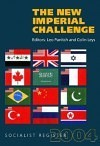Imperialism

Samir Amin’s ambitious new book argues that the ongoing American project to dominate the world through military force has its roots in European liberalism, but has developed certain features of liberal ideology in a new and uniquely dangerous form. Where European political culture since the French Revolution has given a central place to values of equality, the American state has developed to serve the interests of capital alone, and is now exporting this model throughout the world. American imperialism, Amin argues, will be far more barbaric than earlier forms, pillaging natural resources and destroying the lives of the poor. | more…
Understanding the Politics of Globalization
The “Seattle Shock”-as Business Week called it in an editorial that warned of a popular backlash against “our very economic system”-reflects heartfelt indignation by the financial press at the intrusion of mass democracy into an elite discourse. In the New York Times, columnist Thomas Friedman raged at anti-World Trade Organization (WTO) protesters, whom he presents as “flat-earth advocates” duped by knaves like Pat Buchanan. Friedman, perhaps the most obtuse of the big-time columnists, complains that “What’s crazy is that the protesters want the W.T.O. to become precisely what they accuse it of already being-a global government | more…
Whether or not it is true, as Vaclav Havel famously claimed, that NATO’s attack on Yugoslavia represents the first war to be waged “in the name of principles and values,” the first “ethical war,” it might well be the case that it is the first act of armed aggression against a sovereign state whose popular legitimization relied almost wholly upon an alleged historical analogy. NATO spokespersons and apologists could not allude often enough to the Second World War,Hitler, and the Nazi regime’s persecution of the Jews. They did this in lieu of providing reasoned justification for NATO’s action, perhaps because under existing international law there was surely no such
justification to be found | more…
On November 30,1999, when the World Trade Organization (WTO) opened its third round of ministerial meetings, the three thousand official delegates, two thousand journalists, and other registered observers were greatly outnumbered by the tens of thousands of protesters who came from all over the world to denounce the organization. Estimates of protester numbers ranged to forty thousand, according to the Seattle Times, which told its readers that the demonstrations were larger than those of 1970, when twenty to thirty thousand people (ten thousand according to the Seattle Times) shut down Interstate 5 to protest the Vietnam War. The parallel is appropriate. The still-growing movement in opposition to efforts of institutions such as the WTO to take over the management of the international economy may well be larger than any popular protest movement of the last twenty years or more. | more…
The economic crisis that has been affecting the global economy for the last two and a half years started in East Asia. We’ve heard story after story about the problems in Thailand, South Korea, Indonesia, Malaysia, China, and even Japan—but we’ve heard almost nothing about the situation in the Philippines. Is there something that the U.S. government, the International Monetary Fund (IMF), and the World Bank don’t want us to know about the situation there? | more…

For forty years, the annual Socialist Register has brought together leading writers on the left to investigate aspects of a common theme. Contributors to this volume consider what imperialism means in the new century by examining the U.S.-led imperialist project currently transforming relations of global power. | more…
We’ve been discussing among ourselves exactly what we want to achieve with these Notes from the Editors, and our conclusion is that we want to leave the objectives of the Notes as open-ended as they always have been. Over the years, they have been everything from editorials about some pressing current event, to news about the MR community, or reflections on something we’ve read, including correspondence from our readers. What these all have in common is that they give us a chance to make more or less current comments on things that have happened or things we’ve been thinking about since the last issue. | more…
Aimé Césaire’s Discourse on Colonialism might be best described as a declaration of war. I would almost call it a “third world manifesto,” but hesitate because it is primarily a polemic against the old order bereft of the kind of propositions and proposals that generally accompany manifestos. Yet, Discourse speaks in revolutionary cadences, capturing the spirit of its age just as Marx and Engels did 102 years earlier in their little manifesto. First published in 1950 as Discours sur le colonialisme, it appeared just as the old empires were on the verge of collapse, thanks in part to a world war against fascism that left Europe in material, spiritual, and philosophical shambles. It was the age of decolonization and revolt in Africa, Asia, and Latin America | more…
Frances Stonor Saunders, Who Paid the Piper: The CIA and the Cultural Cold War (London: Granta Books), £20.
This book provides a detailed account of the ways in which the CIA penetrated and influenced a vast array of cultural organizations, through its front groups and via friendly philanthropic organizations like the Ford and Rockefeller Foundations. The author, Frances Stonor Saunders, details how and why the CIA ran cultural congresses, mounted exhibits, and organized concerts. The CIA also published and translated well-known authors who toed the Washington line, sponsored abstract art to counteract art with any social content and, throughout the world, subsidized journals that criticized Marxism, communism, and revolutionary politics and apologized for, or ignored, violent and destructive imperialist U.S. policies. The CIA was able to harness some of the most vocal exponents of intellectual freedom in the West in service of these policies, to the extent that some intellectuals were directly on the CIA payroll. Many were knowingly involved with CIA “projects,” and others drifted in and out of its orbit, claiming ignorance of the CIA connection after their CIA sponsors were publicly exposed during the late 1960s and the Vietnam war, after the turn of the political tide to the left | more…
Organized labor has always privileged collective struggle at the point of production, judging it to be capital’s most vulnerable point. Denying employers the labor power needed for the production of surplus value strikes at the reproduction and expansion of capital, the accumulation process which is the core of the system | more…
We’ve received three letters from readers complaining about our articles on Kosovo. While this isn’t a groundswell of opinion, we assume that there are other readers out there who share the concerns of these critics, and since this is an important issue, we think it’s worth returning to it. We won’t go over the same ground again, but we want to take up at least one larger question raised by the critics | more…

The route to any coherent understanding of our time runs through the issues addressed in this collection of essays: the political meaning of Islam, the relation of the West to the Islamic world, the new form of imperialism signaled by the Soviet and U.S. occupations of Afghanistan, the intractable conflict over Palestine. In confronting these inescapable issues global power is being reshaped and the ends for which it will be used are being decided. | more…


